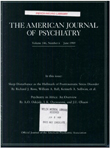Obsessive-compulsive disorder with psychotic features: a phenomenologic analysis
Abstract
The authors review the literature on obsessive-compulsive disorder and present clinical vignettes to illustrate that delusions can arise in the course of this illness. These delusions do not signify a schizophrenic diagnosis but represent reactive affective or paranoid psychoses, which are generally transient. Using a phenomenologic analysis of 23 patients, the authors further argue that obsessive- compulsive disorder represents a psychopathological spectrum varying along a continuum of insight. Patients at the severe end of this spectrum are best described as having an "obsessive-compulsive psychosis." The authors discuss the implications of these considerations for DSM-III revisions.
Access content
To read the fulltext, please use one of the options below to sign in or purchase access.- Personal login
- Institutional Login
- Sign in via OpenAthens
- Register for access
-
Please login/register if you wish to pair your device and check access availability.
Not a subscriber?
PsychiatryOnline subscription options offer access to the DSM-5 library, books, journals, CME, and patient resources. This all-in-one virtual library provides psychiatrists and mental health professionals with key resources for diagnosis, treatment, research, and professional development.
Need more help? PsychiatryOnline Customer Service may be reached by emailing [email protected] or by calling 800-368-5777 (in the U.S.) or 703-907-7322 (outside the U.S.).



